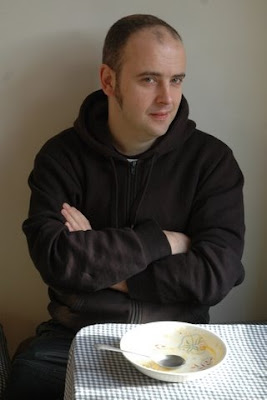 Eyewear is very glad to welcome Alistair Noon (pictured) this Friday. Noon (born in 1970) grew up in Aylesbury, studied German and Russian, and has lived in Russia and China. He has been based in Berlin since the early 90s. In the later 90s he wrote sound poetry and performed at sound art festivals internationally. I first met him, a few years back, when he and I both performed at a Magma launch, at the Troubador, in London.
Eyewear is very glad to welcome Alistair Noon (pictured) this Friday. Noon (born in 1970) grew up in Aylesbury, studied German and Russian, and has lived in Russia and China. He has been based in Berlin since the early 90s. In the later 90s he wrote sound poetry and performed at sound art festivals internationally. I first met him, a few years back, when he and I both performed at a Magma launch, at the Troubador, in London.He's an active translator. Noon's translations include, from German, WWI Expressionist poet August Stramm and emerging contemporary figure Monika Rinck; from Russian, Pushkin's The Bronze Horseman, and from Chinese, contemporary poet Xiao Kaiyu.
Noon has worked as a language teacher, translator and most recently in hospital administration in Berlin. He coordinates an excellent annual reading series in that city, Poetry Hearings, and is an editor of Bordercrossing Berlin, a superb-looking periodical, with much of value in it. His recent essay "Translocal Underground: Anglophone Poetry and Globalization" appears in issue #3. It's recommended reading.
Noon is a poet-critic worth knowing about. As such, I've published his work at Nthposition, invited him to read in London at my Oxfam series, and, more recently, been happy to feature his review work here at Eyewear. Seek his work out. Happily, there is some below...
The Lakefarers
The sky was simple as we pushed from the quay;
there was no storm to fear with the far shore in sight.
We trusted the surface, knew the day would end
as unsalient as bare feet on wet grass.
We clutched at the rail and giggled as the first
lurch of the keel warped our course.
This was no case for the luminous waistcoat,
no hands looped on fear. We were aboard.
No face went lame or lips turned dry
under the moving sky.
Then Ear Lake bared its length to a blast
from helix to lobe. The wind blew trenches
in the water, pounded lakeside trunks. Gusts
shocked the boat, their timing guesses. The turn
to the shore would twist and capsize us, the sliding
door of the cabin slammed open and shut.
Sniffed and licked by a faithful fear,
we looked into the fathoms. The Captain’s wage,
crisp and light, was no currency we could take
to the floor of Ear Lake.
Skill in misjudgement or a kind of jinxed luck,
tillered our hull towards land
until the waves and our pulse rates lowered.
Shining stone crawled out of the sky,
and we slowed to the zone of shallow breaths.
Were we drugged by New Year’s Eve,
our senses less than acute? Our feet
wobbled on the gunwale, our minds a collision
of curses at Captains and at our trust
in a misjudged mission.
poem by Alistair Noon; photo by Clare Jephcott
Comments